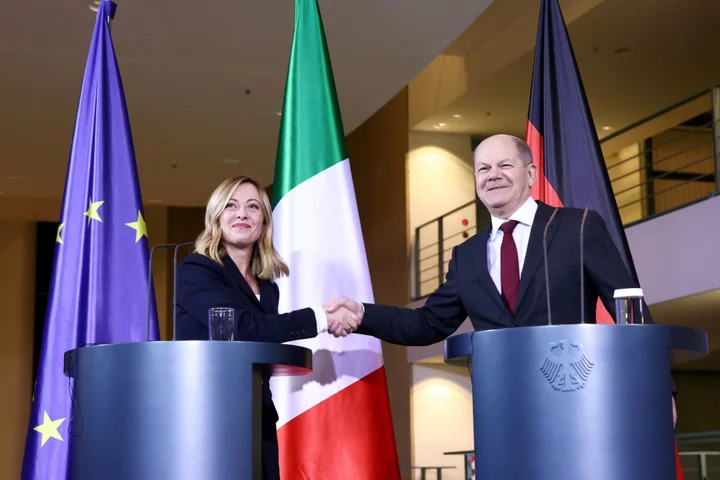Italian Prime Minister Giorgia Meloni and German Chancellor Olaf Scholz are spearheading a series of closer business dealings between their two countries — with France being sidelined.
Meloni’s first visit to Berlin on Wednesday, accompanied by senior government ministers, marked the nations’ highest-level gathering in seven years. Scholz welcomed his guest as “dear Giorgia” as a series of fiscal wins for Rome coincided with a budget debacle in Berlin.
The warmth reflects a series of moves by Meloni’s administration in recent weeks to facilitate foreign corporate ties, including with German involvement and at the expense of France. They have ranged from aerospace to airlines and telecom.
Berlin played a key role in Rome’s decision to veto the takeover by France’s Safran SA of a local aerospace business, according to the ruling seen by Bloomberg. During consultations with Rome, German officials warned that the purchase of Microtecnica Srl could block key supply lines, the document showed.
“Germany has represented that the acquisition of Microtecnica Srl could lead to the interruption of the supply of spare parts and services within the Eurofighter and Tornado programs,” the ruling said in reference to jet projects.
Italy failed to inform France before it exercized its so-called “golden power,” which gives the state oversight on deals involving assets deemed to be of strategic national value, according to people familiar with the matter who asked not to be named on a confidential issue. That triggered irritation in Paris.
Meloni offered France, without naming the country, a chance for a belated briefing as she stood alongside Scholz in Berlin. “Clearly there will be no lack of opportunities for the Italian government to illustrate the reasons for this measure to partners, which are related above all to our efficiency and our security,” Meloni told reporters.
Safran Blindsided
Safran itself complained that it had been blindsided by the veto, which it called ironic because it has proved for years that it’s a reliable supplier to multiple defense programs.
Meloni went on to say that Italy plans to notify the European Union next week of progress on the sale of a stake in ITA Airways, the country’s flagship carrier, to Deutsche Lufthansa AG, a deal which has been in the making for months and that rival Air France-KLM has been monitoring closely. Rome has pressed Brussels to hasten approval of the takeover, aiming to rid itself of a historically unprofitable asset.
Since Meloni took office last year, Italy and France have made significant headway to mend rocky relations, but some tension remains when it comes to business deals, people familiar with the matter said.
Rome has a long tradition of acrimony toward Paris over French business acquisitions in Italy, seen as carried out in a domineering way and with little regard for local concerns.
Officials in Rome still complain about a 2006 Enel SpA bid for French company Suez SA that was stymied by then President Jacques Chirac. Diplomats still bristle at President Emmanuel Macron organizing a 2017 meeting with Libyan authorities in Paris, without inviting Italy which was deeply involved in talks with the North African country.
More recently, Italy and France scrapped a long-planned tie-up between their Fincantieri SpA and Chantiers de l’Atlantique shipyards, blaming the economic downturn and a failure to get European antitrust approval.
Tensions are plaguing an attempt by Telecom Italia SpA, Italy’s former phone monopoly, to sell its landline network to US investment firm KKR & Co for as much as €22 billion ($24 billion). French media conglomerate Vivendi SE, the company’s largest shareholder, is challenging the deal. Vivendi has said it “will use any legal means at its disposal” to fight the plan.
--With assistance from Benedikt Kammel, Flavia Rotondi, Zoe Schneeweiss and Arne Delfs.
Author: Alessandra Migliaccio, Albertina Torsoli and Ania Nussbaum

